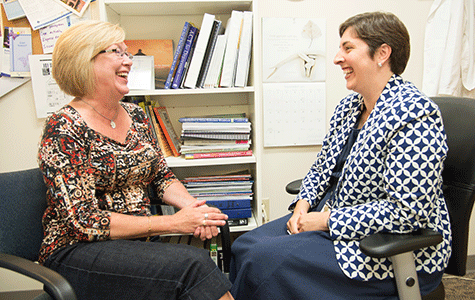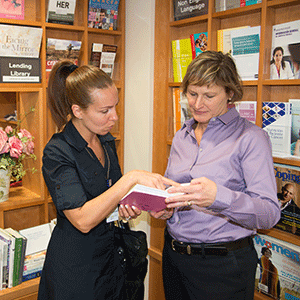
Fighting cancer in the clinic requires a team of experts: medical oncologists, nurses, radiologists. For many patients, another integral member is a licensed clinical psychologist, someone who can help sort fact from fear and help navigate the stress of cancer diagnosis and survivorship.
“I went from having it all together to flipping out pretty quickly,” said Eileen Garofalo, who in January 2012 was diagnosed at age 49 with a pancreatic neuroendocrine tumor, the same as Apple founder Steve Jobs had. “It’s like all of a sudden you’re living in a foreign country. You don’t speak the language. You’re not familiar with the surroundings. You don’t know how to find your way around.”
Garofalo, of O’Fallon, Mo., and fellow patients are why Siteman Counseling Service exists, said Teresa Deshields, PhD, one of three licensed psychologists who provide free, evidence-based therapy at Siteman Cancer Center at Barnes-Jewish Hospital and Washington University School of Medicine in St. Louis.
“We see patients with any type of cancer anywhere along the continuum of care: newly diagnosed, in treatment, wrestling with survivorship, end of life,” said Deshields, who is joined by Mark Heiland, PhD, and Amanda Kracen, PhD. “One thing that makes us a little different from other cancer centers is that we also see family members and caregivers.”
The services are free, regardless of a person’s insurance status or ability to pay. Because there are no billing issues, a physician referral, while welcomed, is not required.
Started under a different name in 1999, the service is based at Siteman’s main location at the Center for Advanced Medicine at Washington University Medical Center. Counseling and therapy services also are available at Siteman Cancer Center at Barnes-Jewish West County Hospital and at Siteman Cancer Center-South County. They will begin at Siteman’s location at Barnes-Jewish St. Peters Hospital in December.
“We can see patients wherever they are: in the hospital, in the infusion center … in my office,” Deshields said.

Siteman Counseling Service recently began offering more group therapy options, including a weekly “mindfulness” practice group that focuses on self-awareness and stress reduction and an online coping-skills class patients can access from home.
Mike Williams, a patient of Deshields’, was skeptical about counseling at first. Diagnosed at another facility in May 2007, he is battling a neuroendocrine carcinoid, a slow-growing cancerous tumor of the digestive track. He has nearly died eight times, he said.
In August 2007, Williams was prepped to undergo the Whipple procedure, a major surgery involving removal of the head of the pancreas. The procedure can be effective as long as the cancer hasn’t metastasized.
“They had assumed I was in the very early stages of this,” said Williams, 51, of his caregivers at the facility where he first sought treatment. “They opened me up and found it had spread all over the place, so they sewed me back up. My doctor later sat on my bed and said, ‘Do you have a will?’
“I wouldn’t say I was in a really dark place. But I was in a relatively dark place. I figured, ‘I’m going to keep fighting, but pretty soon I’m going to die.’”
Williams, who switched his care to Siteman, soon met Deshields. She encouraged him to join support groups and to lean on others, a reversal of roles to which he wasn’t accustomed. “I’m one of those guys everybody leans on. I didn’t accept people being there for me,” he said.
Through support groups and elsewhere, Williams found people he felt he could trust and gain strength from, and he worked to solidify those relationships, he said. Without Deshields’ encouragement, “I’m pretty sure I would have withdrawn into myself,” he said.
Despite his ongoing treatment, Williams has resumed his role of being there for others. For the past five years, he has participated in the formal training of first-year medical students, explaining to them a patient’s perspective and the roles of empathy and faith. Williams also mentors about 10 other cancer patients.
Garofalo is among those with whom Williams has connected. The two met through an online support network, and Williams encouraged her to speak with a Siteman psychologist.
“Counseling helped open me up to do this,” he said. “It’s what made me listen to myself and say, ‘You know what? I can get a lot out of this by helping other people.’ And Teresa opened that up to me.”
Garofalo said receiving the best medical care possible is the core of her treatment. But a cancer care team also must address the psychological, emotional and spiritual aspects of living with the disease, she said. Counseling has provided her with a comfortable environment where she can discuss her “new normal” and where she has learned to trust her medical-care providers even more, she said. She has been meeting regularly with Kracen for almost two years.
“Without that, I would have been like someone who is drowning,” Garofalo said. “Dr. Kracen, for me, was the rescue swimmer. I needed somebody to help get me back to shore, to live my life in as healthy of a way as I could.”
For more information about Siteman Counseling Service, or to make a referral, call (314) 747-5587.